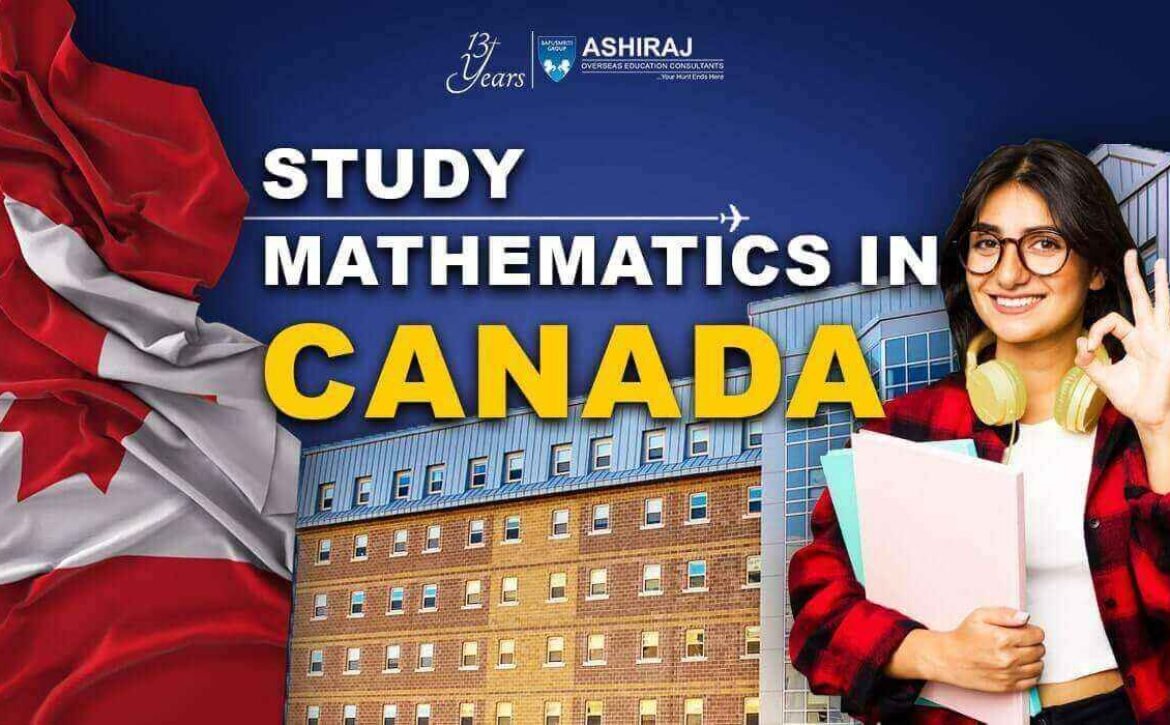
Mathematics in Canada
Mathematics in Canada holds a significant place in the country’s educational landscape and its broader socio-economic fabric. From pioneering research to fostering a skilled workforce, Canada’s commitment to mathematics education resonates across various sectors. With a strong emphasis on STEM (Science, Technology, Engineering, and Mathematics) disciplines, Canadian institutions prioritize mathematical literacy and proficiency from elementary to post-secondary levels. Mathematics in Canada encompasses a diverse array of fields, including pure mathematics, applied mathematics, statistics, and computational mathematics, catering to both theoretical exploration and practical applications.
In addition to its academic pursuits, Mathematics in Canada plays a crucial role in driving innovation and competitiveness in industries such as finance, technology, and healthcare. Through collaborative research initiatives, government support, and a robust network of academic and industry partnerships, Canada continues to advance mathematical knowledge and its real-world applications. As Canada embraces the digital age and the challenges of an increasingly complex global landscape, the role of mathematics remains integral in shaping the country’s future trajectory and maintaining its position as a leader in scientific and technological innovation.
Why to Study Mathematics in Canada?
- Academic Excellence: Canada boasts world-renowned institutions with strong mathematics departments, offering high-quality education and research opportunities.
- Diverse Programs: From pure mathematics to applied mathematics, statistics, and computational mathematics, Canadian universities offer a wide range of specialized programs catering to various interests and career goals.
- Skilled Faculty: Mathematics departments in Canada are staffed with expert faculty members who are actively engaged in research and bring real-world experience to the classroom.
- Research Opportunities: Canada fosters a vibrant research environment, providing ample opportunities for undergraduate and graduate students to participate in cutting-edge research projects.
- Multicultural Environment: Studying mathematics in Canada offers exposure to diverse perspectives and cultures, enriching the learning experience and fostering global citizenship.
- Industry Connections: With strong ties to industries such as finance, technology, and healthcare, studying mathematics in Canada provides access to valuable internships, co-op programs, and job opportunities.
- Supportive Community: Canadian universities prioritize student support services, ensuring that students have access to resources, mentorship, and academic assistance.
- Quality of Life: Canada offers a high standard of living, safety, and a welcoming environment for international students pursuing mathematics education.
Studying mathematics in Canada provides a unique opportunity to engage with a rich academic landscape, gain valuable skills, and prepare for a successful career in a rapidly evolving global economy. With its focus on innovation, research, and excellence, Mathematics in Canada continues to attract students from around the world seeking a world-class education.
Top Universities to Study Mathematics in Canada
University | QS World University Rankings 2023 | Type of University | Average Annual Fees | Programs Offered |
University of Toronto | 1 | Public | $7,500 – $55,000 | Pure Mathematics, Applied Mathematics, Statistics, Computational Mathematics |
University of British Columbia | 3 | Public | $8,000 – $45,000 | Mathematics, Mathematical Sciences, Statistics |
McGill University | 4 | Public | $9,000 – $45,000 | Mathematics, Applied Mathematics, Statistics, Actuarial Mathematics |
University of Waterloo | 7 | Public | $7,000 – $50,000 | Pure Mathematics, Applied Mathematics, Statistics, Computational Mathematics |
University of Alberta | 8 | Public | $8,000 – $40,000 | Mathematics, Applied Mathematics, Statistics, Computational Mathematics |
The top universities in Canada for Mathematics offer a diverse range of programs catering to various interests and career paths. These institutions, renowned for their academic excellence and research contributions, attract students from around the globe seeking quality education in Mathematics in Canada. With affordable tuition fees and a wide array of programs, students have ample opportunities to pursue their academic and professional aspirations in this field.
Course Curriculum for Mathematics in Canada
- Comprehensive Foundations: Mathematics in Canada curriculum typically starts with foundational courses covering topics such as calculus, algebra, and geometry, providing students with a solid understanding of fundamental concepts.
- Specialized Tracks: Students have the opportunity to choose from specialized tracks based on their interests, including pure mathematics, applied mathematics, statistics, and computational mathematics, tailoring their education to their career goals.
- Practical Applications: Mathematics courses in Canada often integrate real-world applications, allowing students to apply theoretical knowledge to solve practical problems encountered in various industries.
- Research Opportunities: Universities offer research-focused courses where students can engage in hands-on research projects under the guidance of experienced faculty, contributing to advancements in the field of Mathematics in Canada.
- Interdisciplinary Approach: Mathematics curriculum in Canada often encourages interdisciplinary collaboration, enabling students to explore connections between mathematics and other fields such as computer science, physics, and economics, fostering a holistic understanding of the subject.
The course curriculum of Mathematics in Canada is designed to provide students with a comprehensive education that equips them with the skills and knowledge needed to excel in both academic and professional settings. With a focus on practical applications, research opportunities, and interdisciplinary collaboration, Mathematics in Canada prepares students for diverse career paths in today’s rapidly evolving world.
Eligibility Criteria & Admission Requirements for MS in Mathematics in Canada
- Language Proficiency:
Applicants must demonstrate proficiency in English by providing scores from either the IELTS (International English Language Testing System) or TOEFL (Test of English as a Foreign Language) exams.
IELTS: Minimum score of 6.5 overall
TOEFL: Minimum score of 90 (iBT)
- Standardized Tests:
Candidates are required to submit scores from either the GRE (Graduate Record Examination) or GMAT (Graduate Management Admission Test).
GRE: Competitive scores vary by institution but typically range from 155-165 in Quantitative Reasoning
GMAT: Competitive scores vary by institution but typically range from 650-700
- Documentation:
Applicants must provide valid passport and student visa documentation.
Academic certificates demonstrating completion of undergraduate studies or equivalent qualifications are required.
Relevant work experience, particularly in mathematics-related fields, may be advantageous and should be included in the application.
Table Format for Scores:
Exam | Minimum Score |
IELTS | 6.5 overall |
TOEFL | 90 (iBT) |
GRE | 155-165 (Quantitative Reasoning) |
GMAT | 650-700 |
Meeting these eligibility criteria ensures that candidates are well-prepared to pursue Mathematics in Canada, facilitating their academic and professional growth in this field.
Documents Required for Studying Mathematics in Canada
- Passport:
Valid passport for identification and visa purposes.
- Two Letters of Recommendation (LOR): Academic or professional references endorsing the applicant’s academic abilities and potential.
- Statement of Purpose (SOP): A personal statement outlining the applicant’s academic background, career goals, and reasons for pursuing Mathematics in Canada.
- Curriculum Vitae (CV): A detailed resume highlighting academic achievements, work experience, extracurricular activities, and relevant skills.
- Official High School Transcripts: Transcripts reflecting academic performance in high school or equivalent education.
- Educational Certificates: Certificates verifying completion of previous academic qualifications, such as undergraduate degrees or diplomas.
- Work Experience Certificate: If applicable, a certificate demonstrating relevant work experience in mathematics-related fields.
- Proof of Financial Resources: Documentation showing the applicant’s ability to cover tuition fees, living expenses, and other costs associated with studying Mathematics in Canada.
Ensuring the submission of these essential documents is crucial for a successful application to Mathematics in Canada programs. These documents provide admissions committees with valuable insights into the applicant’s academic background, qualifications, and readiness for pursuing advanced studies in mathematics.
Admission Process for Mathematics in Canada
- Research Institutions: Research universities offering Mathematics in Canada programs and identify those aligning with your academic interests and career goals.
- Review Requirements: Thoroughly review admission requirements, including academic qualifications, standardized test scores (such as GRE or GMAT), language proficiency (IELTS or TOEFL), and documentation.
- Prepare Documents: Gather necessary documents, including passport, transcripts, educational certificates, letters of recommendation (LOR), statement of purpose (SOP), curriculum vitae (CV), work experience certificates, and proof of financial resources.
- Take Standardized Tests: Schedule and take required standardized tests (GRE/GMAT for some programs, IELTS/TOEFL for English proficiency) and ensure scores meet or exceed minimum requirements.
- Submit Application: Complete and submit the online application form along with required documents through the university’s admissions portal within the specified deadline.
- Await Response: Wait for the university’s decision on your application. This process may take several weeks to months, depending on the institution and program.
- Acceptance and Visa: If accepted, receive an acceptance letter from the university. Proceed to obtain a student visa by submitting necessary documentation, including the acceptance letter and proof of financial resources.
- Prepare for Arrival: Upon receiving the student visa, make necessary arrangements for accommodation, travel, and other logistics before starting Mathematics in Canada studies.
Following these steps diligently ensures a smooth and successful admission process to Mathematics in Canada programs, setting the stage for a rewarding academic journey.
“Education is the most powerful weapon which you can use to change the world.”
Nelson Mandela
Cost of Mathematics Course in Canada
- Tuition Fees: The cost of tuition for Mathematics in Canada programs varies depending on the institution, program level, and residency status. On average, undergraduate tuition ranges from CAD $7,000 to $30,000 per year, while graduate tuition can range from CAD $8,000 to $50,000 per year.
- Living Expenses: In addition to tuition fees, students should budget for living expenses, including accommodation, food, transportation, and personal expenses. On average, students can expect to spend approximately CAD $10,000 to $15,000 per year on living costs, depending on the city and lifestyle.
- Scholarships and Financial Aid: Many universities offer scholarships, grants, and bursaries to help offset the cost of studying Mathematics in Canada. Eligibility criteria and application deadlines vary, so students should research and apply for financial assistance opportunities.
- Part-time Work: Some students work part-time to supplement their income while studying Mathematics in Canada. However, it’s essential to balance work commitments with academic responsibilities and maintain compliance with visa regulations.
- Healthcare Coverage: International students may be required to purchase health insurance coverage while studying Mathematics in Canada, either through their university or a private provider. Costs for health insurance vary depending on the coverage provided.
Understanding the cost of studying Mathematics in Canada enables students to plan their finances effectively and pursue their academic goals without financial stress.
Scholarships for Mathematics Courses in Canada
Scholarship Name | Amount | Application Deadline |
Vanier Canada Graduate Scholarships | CAD 50,000 per year | November 1 (annually) |
Canada Graduate Scholarships – Master’s Program | CAD 17,500 for one year | December 1 (annually) |
Canada Graduate Scholarships – Doctoral Program | CAD 35,000 per year | December 1 (annually) |
Ontario Graduate Scholarship (OGS) | CAD 10,000 for one year | Varies by institution |
NSERC Postgraduate Scholarships | CAD 21,000 to $35,000 per year | October 17 (annually) |
Scholarships play a crucial role in supporting students pursuing Mathematics in Canada by providing financial assistance to cover tuition fees, living expenses, and other costs associated with higher education. These scholarships are highly competitive, and applicants are encouraged to submit their applications well before the deadlines to maximize their chances of success. With a range of scholarships available, students have opportunities to excel academically and pursue their passion for Mathematics in Canada without financial constraints.
Career Opportunities After Mathematics in Canada
Job Profile | Average Salary (CAD) |
Data Analyst | $60,000 – $90,000 |
Actuary | $70,000 – $120,000 |
Statistician | $65,000 – $100,000 |
Financial Analyst | $65,000 – $95,000 |
Operations Research Analyst | $65,000 – $100,000 |
Mathematics in Canada opens doors to diverse career opportunities across various industries, with professionals in high demand for their analytical and problem-solving skills. Data analysts utilize mathematical techniques to interpret data and provide valuable insights to organizations, earning competitive salaries ranging from $60,000 to $90,000 annually. Actuaries, specializing in risk assessment and financial forecasting, command salaries between $70,000 and $120,000 per year. Statisticians play a crucial role in data analysis and interpretation, earning average salaries ranging from $65,000 to $100,000 annually. Financial analysts utilize mathematical models to analyze market trends and investment opportunities, with salaries averaging between $65,000 and $95,000 per year. Operations research analysts apply mathematical methods to optimize processes and decision-making, earning salaries between $65,000 and $100,000 annually. With a strong foundation in mathematics, graduates in Canada can pursue rewarding careers with lucrative salary prospects in a variety of fields.
Frequently Asked Questions About Mathematics in Canada
Several universities in Canada offer Mathematics programs, including the University of Toronto, University of British Columbia, McGill University, University of Waterloo, and University of Alberta, among others.
Admission requirements vary by institution but typically include academic transcripts, standardized test scores (such as GRE or GMAT), language proficiency (IELTS or TOEFL), letters of recommendation, statement of purpose, and relevant documentation.
Yes, there are scholarships available for Mathematics students in Canada, including the Vanier Canada Graduate Scholarships, Canada Graduate Scholarships, Ontario Graduate Scholarship (OGS), and NSERC Postgraduate Scholarships, among others.
Mathematics graduates in Canada can pursue careers as data analysts, actuaries, statisticians, financial analysts, operations research analysts, and more, across various industries such as finance, technology, healthcare, and government.
Salaries for Mathematics graduates in Canada vary depending on factors such as job role, industry, experience, and location. On average, salaries range from $60,000 to $120,000 per year.
Specializations within Mathematics programs in Canada may include pure mathematics, applied mathematics, statistics, computational mathematics, and actuarial mathematics, among others.
Yes, Canadian universities offer research opportunities for Mathematics students, allowing them to engage in cutting-edge research projects under the guidance of experienced faculty members.
The duration of a Mathematics degree in Canada varies depending on the program and level of study. Typically, undergraduate degrees take around four years to complete, while graduate degrees may take two to five years or more.
Yes, international students can study Mathematics in Canada by meeting the admission requirements, obtaining a student visa, and fulfilling any other necessary criteria.
Mathematics students in Canada have access to various resources for academic support, including faculty office hours, tutoring services, study groups, online resources, and academic advising.




